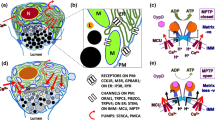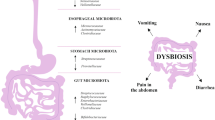Abstract
We have recently found that bacterial lipopolysaccharide (LPS) or endotoxin at minute doses inhibits the secretion of gastric acid and pepsin in rats. The present study was performed to determine whether this antisecretory action of LPS was a reversible biological response or a result of the destruction of gastric parietal cells by endotoxin. The intraperitoneal injection of LPS into pylorus-ligated rats resulted in a dose-related (40–4000 ng/kg) decrease in gastric acid secretion, with maximal inhibition being observed at a dose of 4000 ng/kg. The stomach then was examined both macroscopically and microscopically for the presence or absence of mucosal lesions or damaged gastric parietal cells. No morphological changes in the gastric mucosal, structure including parietal cells were observed even in the rats injected with 4000 ng/kg of LPS. Next, basal gastric acid output was compared in the rats that had received LPS (4000 ng/kg, intraperitoneal) or saline alone 24 hr before. There was no significant difference in gastric, acid secretion between the saline- and LPS-pretreated groups, indicating that the secretory capacity of gastric parietal cells returned to the control level at 24 hr after the injection of a maximal antisecretory dose of LPS. These results clearly suggest that the LPS-induced inhibition of gastric secretion results not from its toxic or destructive effect on the gastric secretory mechanism but from its reversible biological effect on gastric physiology.
Similar content being viewed by others
References
Kass EH, Wolff SM (eds.): Bacterial Lipopolysaccharides: The Chemistry, Biology, and Clinical Significance of Endotoxins. Chicago, The University of Chicago Press, 1973
Richardson RS, Norton LW, Sales JEL, Eiseman B: Gastric blood flow in endotoxin-induced stress ulcer. Arch Surg 106:191–195, 1973
Cheung LY, Reese RS, Moody FG: Direct effect of endotoxin on the gastric mucosal microcirculation and electrical gradient. Surgery 79:564–568, 1976
Uehara A, Okumura T, Okamura K, Takasugi Y, Namiki M: Lipopolysaccharide-induced inhibition of gastric acid and pepsin secretion in rats. Eur J Pharmacol 181:141–145, 1990
Tsuji K, Uehara A, Okumura T, Taniguchi Y, Kitamori S, Takasugi Y, Namiki M: The gastric antisecretory action of lipopolysaccharide is blocked by indomethacin Eur J Pharmacol (in press)
Uehara A, Okumura T, Sekiya C, Okamura K, Takasugi Y, Namiki M: Interleukin-1 inhibits the secretion of gastric acid in rats: possible involvement of prostaglandin. Biochem Biophys Res Commun 162:1578–1584, 1989
Kuroshima A, Habara Y, Uehara A, Murazumi K, Yahata Y, Ohno T: Cross adaptation between stress and cold in rats. Pflugers Arch (Eur J Physiol) 402:402–408, 1985
Impicciatore M, Hansen DG, Rachmilewitz D, Maitra SK, Lugaro G, Grossman MI: Comparison of human urine gastric inhibitor (HUGI) and bacterial endotoxin as inhibitors of acid secretion. Eur J Pharmacol 65:365–368, 1980
Uehara A, Okumura T, Kitamori S, Takasugi Y, Namiki M: Interleukin-1: A cytokine that has potent antisecretory and anti-ulcer actions via the central nervous system. Biochem Biophys Res Commun 173:585–590, 1990
Okumura T, Uehara A, Okamura K, Takasugi Y, Namiki M: Inhibition of gastric pepsin secretion by peripherally or centrally injected interleukin-1 in rats. Biochem Biophys Res Commun 167:956–961, 1990
Ishikawa T, Nagata S, Ago Y, Takahashi K, Karibe M: The central inhibitory effect of interleukin-1 on gastric acid secretion., Neurosci Lett 119:114–117, 1990
Saperas ES, Yang H, Rivier C, Taché Y: Central action of recombinant interleukin-1 to inhibit acid secretion in rats. Gastroenterology 99:1599–1606, 1990
Robert A, Olafsson AS, Lancaster C, Zhang W-R: Interleukin-1 is cytoprotective, antisecretory, stimulates PGE2 synthesis by the stomach, and retards gastric emptying. Life Sci 48:123–134, 1991
Dinarello CA: Interleukin-1. Rev Infect Dis 6:51–95, 1984
Uehara A, Sekiya C, Takasugi Y, Namiki M: Anorexia induced by interleukin-1: Involvement of corticotropinreleasing factor. Am J Physiol 257:R613-R617, 1989
Okumura T, Uehara U, Kitamori S, Okamura K, Takasugi Y, Namiki M: Prevention by interleukin-1 of thyrotropinreleasing hormone (TRH)-induced gastric mucosal lesions in rats. Neurosci Lett 125:31–33, 1991
Takagi K, Kasuya Y, Watanabe K: Studies on the drugs for peptic ulcer. A reliable method for producing stress ulcer. Chem Pharm Bull 12:465–472, 1964
Goto Y, Taché Y: Gastric erosions induced by intracisternal thyrotropin-releasing hormone (TRH) in rats. Peptides 6:153–156, 1985
Wallace JL, Keenan CM, Mugridge KG, Parente L: Reduction of the severity of experimental gastric and duodenal ulceration by interleukin-1 beta. Eur J Pharmacol 186:279–284, 1990
Author information
Authors and Affiliations
Additional information
This study was supported by a grant (12-A) from the National Center of Neurology and Psychiatry (NCNP) of the Ministry of Health and Welfare, Japan, and by a grant, from the Meiji Welfare Foundation in Japan.
Rights and permissions
About this article
Cite this article
Uehara, A., Okumura, T., Tsuji, K. et al. Evidence that gastric antisecretory action of lipopolysaccharide is not due to a toxic effect on gastric parietal cells. Digest Dis Sci 37, 1039–1044 (1992). https://doi.org/10.1007/BF01300284
Received:
Revised:
Accepted:
Issue Date:
DOI: https://doi.org/10.1007/BF01300284




